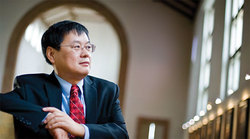
Dr. Fenggang Yang is the director of the Center on Religion and Chinese Society at Purdue University. He is also a professor of sociology and the author of Religion in China: Survival and Revival Under Communist Rule. He has been interviewed in numerous media outlets, including NPR, The Economist, and The New York Times.
I recently had the chance to pose three questions to Professor Yang.
3 Questions
1. You made a trip to China this past summer. What is one key observation from your recent visit to China, especially in regards to the climate/environment for the church?
I traveled in China for two weeks in late June and early July, 2015. During this trip I sensed a clear rise of the sentiment of national pride among people in different walks of life. Most people appeared to be more confident than ever in China’s present and future. People seemed motivated in their businesses or jobs and are actively looking for ways to do them better. The material life of most people appeared to be improving. However, the other side of the coin of national pride is nationalism. There was more blatant nationalistic arrogance expressed by ordinary people.
Regarding the church, with my limited observation during this short trip, I can only say that I didn’t see any sign that church growth is slowing. I saw that Christians continue to actively respond to the spiritual thirst and social needs of people around them. Indeed, I sensed much creativity among these Christians in building up the church and reaching out to do evangelism.
2. For the past year, authorities in Zhejiang Province have been conducting a campaign to tear down "illegal" churches and crosses. How do you see this campaign affecting the attitudes (and mood) of ordinary Christians in China?
During this trip I didn’t go to Zhejiang, the focal point of church-state tensions in the last a couple of years, and I didn’t visit leaders of the Shouwang Church in Beijing, whose senior pastor Jin Tianming remains under de facto house arrest since Easter of 2011. Most of the few Christians that I talked with during this short trip felt some kind of political pressure from the authorities. They were aware of, well informed of, and watching closely what has been going on in Zhejiang.
Some of them make certain attempts to communicate their concerns to officials when they have the opportunity. Some of them are hopeful or wishful that the top leaders of the Chinese Communist Party disapprove of the cross demolition campaign in Zhejiang.
One of my friends, Mr. Zhang Kai, a lawyer and an ordinary Christian, expressed strong concern about it when we met during my recent trip.
Soon after I left China, there was a new wave of intensified campaign. In response to the intensification, Zhang Kai put aside other work in hand and went to Zhejiang. He has served as the counsel to nearly a hundred churches that have experienced the fiercest storms of the campaign. Unfortunately, Zhang Kai, along with several pastors of those churches, has been under secret detention since August 25.
Secret detention means no access by his lawyers or family members and nobody knows his whereabouts. Secret detention in China is always associated with physical and psychological torture. This is a very extreme measure against the cross defenders. As far as I can tell, these Christians so far have been only trying to resolve the conflicts through legal means within the existing legal framework. Now the Zhejiang authorities have totally shut down the path of legal defense.
The Zhejiang authorities may hope to use this extreme measure to deter other Christians from following suit, but it may result in unintended consequences.
3. The Center that you direct was recently awarded a Templeton grant to map the religious landscape in China. (Congratulations, by the way!). Can you briefly tell us what you hope to accomplish in this three-year study and what questions will you be trying to answer?
This initiative expands on the social, scientific study of religion in China by pursuing three inter-related goals: mapping the religious landscape and the changing religious markets, assessing spiritual capital in the emerging civil society, and nourishing the growing field through publishing first-rate research in the new journal Review of Religion and Chinese Society. We plan to study (1) religion as a social fact: What is the current state of religion and religions in China? (2) Religion as a dependent variable: How did religion survive and revive under Communist rule? And (3) religion as an independent variable: What are the roles of religions in social and economic transitions?
We plan to present our empirical findings through books, articles, essays and the CRCS E-Newsletter.
Image credit: Joann Pittman, via Flickr

Joann Pittman
Joann Pittman is Vice President of Partnership and China Engagement and editor of ZGBriefs. Prior to joining ChinaSource, Joann spent 28 years working in China, as an English teacher, language student, program director, and cross-cultural trainer for organizations and businesses engaged in China. She has also taught Chinese at the University …View Full Bio
Are you enjoying a cup of good coffee or fragrant tea while reading the latest ChinaSource post? Consider donating the cost of that “cuppa” to support our content so we can continue to serve you with the latest on Christianity in China.